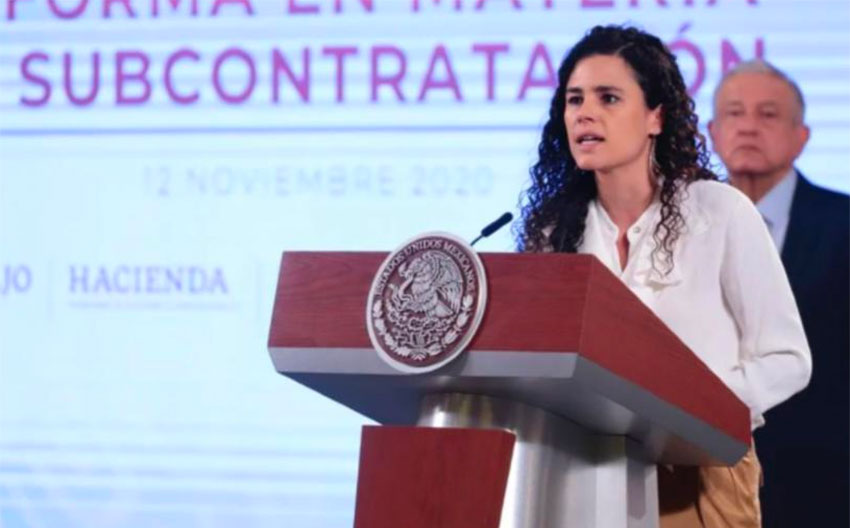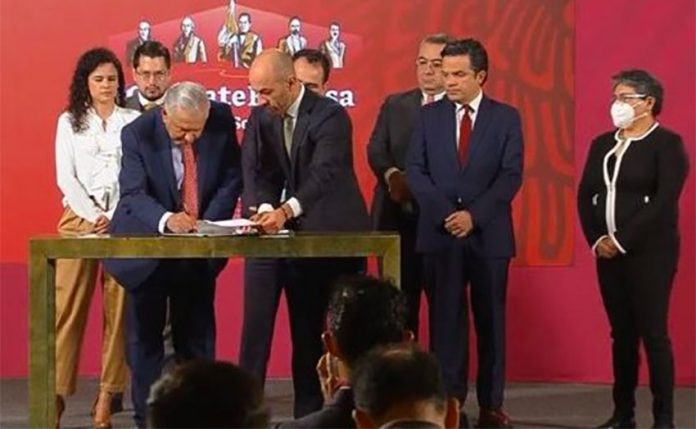President López Obrador sent a proposal to Congress on Thursday to ban subcontracting or outsourcing of jobs by private companies without prior government authorization.
“We’re going to present a bill to put order to everything related to subcontracting, so-called outsourcing,” López Obrador told reporters at his regular news conference.
“It’s been used as a form of tax fraud and above all it affects workers because … they’re denied their job benefits.”
Maintenance, cleaning and warehouse jobs are commonly subcontracted to staffing agencies in Mexico by companies looking to avoid the costs of advertising for and hiring employees themselves or seeking to bolster their workforces for seasonal needs.
Critics of outsourcing say that there is evidence that an increasing number of skilled and permanent jobs are also being outsourced.
The bill to be considered by the Congress says that staffing companies can assist private firms in the recruitment and training process of employees but cannot be listed as their employer. Subcontracted workers would be allowed to provide “specialized services or carry out specialized projects that are not part of a company’s line of business” but only after receiving approval from the Labor Ministry.
López Obrador said that he expected lawmakers to analyze, build on and approve the bill as soon as possible.
He said that outsourcing currently causes mass dismissals at the end of the year because companies want to avoid paying bonuses and other benefits to employees as well as prevent them from accumulating seniority.
Labor Ministry Luisa María Alcalde said that the number of people in subcontracted or outsourced positions grew from an estimated 1 million in 2003 to about 4.6 million in 2018, the year the current government took office.
She cited the case of a hotel in Cancún, where 802 people worked but only two were registered as hotel employees. She said that many of the workers were placed on fictitious three-month contracts and subsequently rehired by a different front company so that they wouldn’t accumulate seniority.
Alcalde said that the salaries of workers at other companies have been incorrectly registered at the minimum wage – currently about US $6 per day – so that employers’ can reduce the benefits they pay.

The labor minister noted that some companies sack workers in December to avoid paying end-of-year bonuses but subsequently re-hire them in January or February.
That happened to 378,000 workers last year, López Obrador said, describing the mass lay-offs as an “abuse” and asserting that the job loss was almost on the scale of monthly dismissals earlier this year due to the pandemic.
Alcalde said that the proposed ban on outsourcing would be enforced with fines or charges that are applicable to tax evasion offenses.
López Obrador floated the idea of legislating against outsourcing late last month, triggering criticism from business groups that said that such a move would inflict more damage on an economy that is already struggling due to the coronavirus pandemic and associated restrictions.
The Mexican Employers Federation (Coparmex) said at the time that it was opposed to the fraudulent use of outsourcing but warned that a blanket ban on the practice “would mean the loss of a considerable number of legitimate and properly paid jobs.”
“We oppose any legal reform that prohibits labor subcontracting that complies with all legal standards,” Coparmex said.
The Business Coordinating Council (CCE), an umbrella organization representing 12 business groups, weighed in on the proposal after López Obrador’s announcement on Thursday. It said that it was both surprised and concerned about the initiative, and that the government had violated a commitment to consult the private sector.
“The proposal as it is set out discourages job creation and places thousands of positions at risk, which would make our country’s fragile economy worse,” the CCE said in statement.
The organization noted that it participated in an open parliament session in the Senate last year at which the possibility of a subcontracting reform was discussed. Consensus was reached that a reform in the area would seek to avoid abuses but maintain current employment sources, the CCE said.
However, the proposal presented by López Obrador doesn’t respect that consensus, it said.
After asserting that it supports the eradication of “irregular subcontracting that doesn’t comply with the current law and which deprives workers of their rights,” the CCE said that a highly restrictive outsourcing law would have a harmful effect on the economy.
“Not only would jobs be lost, income from exports would also be placed at risk because sectors like the automotive, aerospace, electronics and mining industries make extensive use of this form of hiring,” it said, adding that it allows companies to find staff quickly.
“We call on federal deputies to establish a new open parliament process in which the private sector can express its points of view and concerns about this proposal,” the CCE said.
Allowing the private sector to have input would allow “pertinent” changes to be made that “avoid greater damage to the employment of millions of Mexican families,” it said.
Amid the coronavirus crisis, “it’s untenable to create greater obstacles in labor matters,” the CCE said. “Authorities and businesspeople should be looking for options to strengthen the economy, not weaken it.”
Source: Associated Press (en), Milenio (sp)
